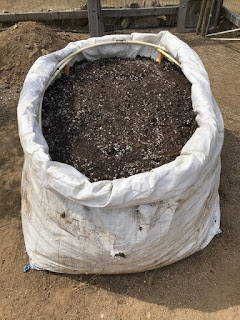Way back on the 13th of August, we visited Vista Haven farms in Elk, with a crowd of 42 avid gardeners and a few nosy neighbors.
Kim and Chris McCay guided us around an amazing farm, complete with berry gardens, asparagus fields, tree fruit orchard, huge compost operations, and on-going projects for salad greens production, and cut-flower raised beds. We tasted wonderful blackberries, and learned of plans for future improvements and direct sales to the public, local farmers' markets, and restaurants.
Oh, and we asked about a million questions of Kim and Chris, and their answers are summarized as follows: blueberry soil amendments used are "Down to Earth" acid mix in Autumn to acidify the local sandy soil, "Espoma" acid mix in the Spring to continue the acidification process, and "Espoma" holly-tone fertilizer to feed the plants. During the Summer (in August), "Neptune Harvest" rose and flower formula is sprayed on the leaves of the plants (foliar feed technique) to improve the flower buds for next year's berry harvest.
To make up for our local soil's natural deficiency in the element boron, "BioLink" micronutrient fertilizer foliar spray is applied to the plants - blueberries especially appreciate the boost.
the blueberry plants were purchased from a commercial nursery (500 plant minimum) in Lowell, ORE. "Fall Creek Nursery" provided 5 varieties: Reka, Blue Ray, Bluecrop, Toro, and Chandler. The bareroot plants were planted into a 50/50 mix of peat moss and the natural sandy soil, to help raise the Ph level in the soil to the optimum of 4.5 to 5.5.
the berry plants were bought from "Indiana Berry", located in Plymouth, IND., and consist of: Earliglow strawberries, Chester and Triple Crown blackberries, and Nova raspberries.
in the huge asparagus field are Purple Passion and Mary Washington varieties. From an earlier taste-test performed by Pat and I, the purple asparagus was excellent! much more enjoyable than the green asparagus, which is what we grow here at Rancho McGinty. we may have to re-think our asparagus raised bed layout 😃.
Kim offered to host another garden club visit in August 2020 to see all the changes and improvements, so if you are interested, be sure to let me know.
and to cap our August visit to Vista Haven Farm, the full moon rose just over the mountain peaks to the east - we had a great evening - thanks to Kim and Chris.
jim.







